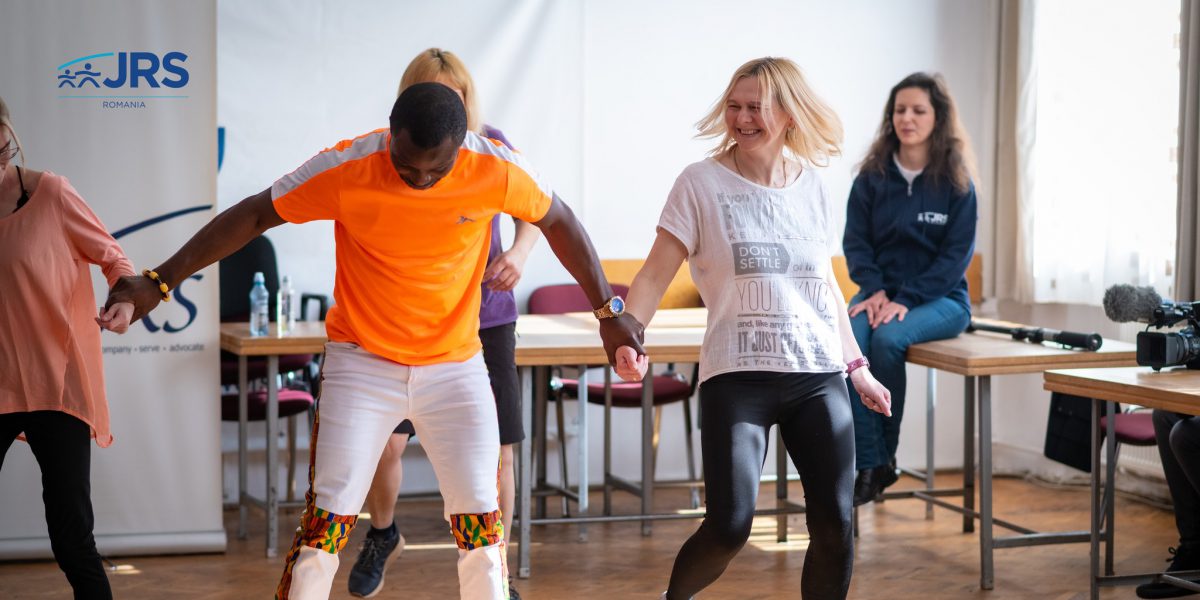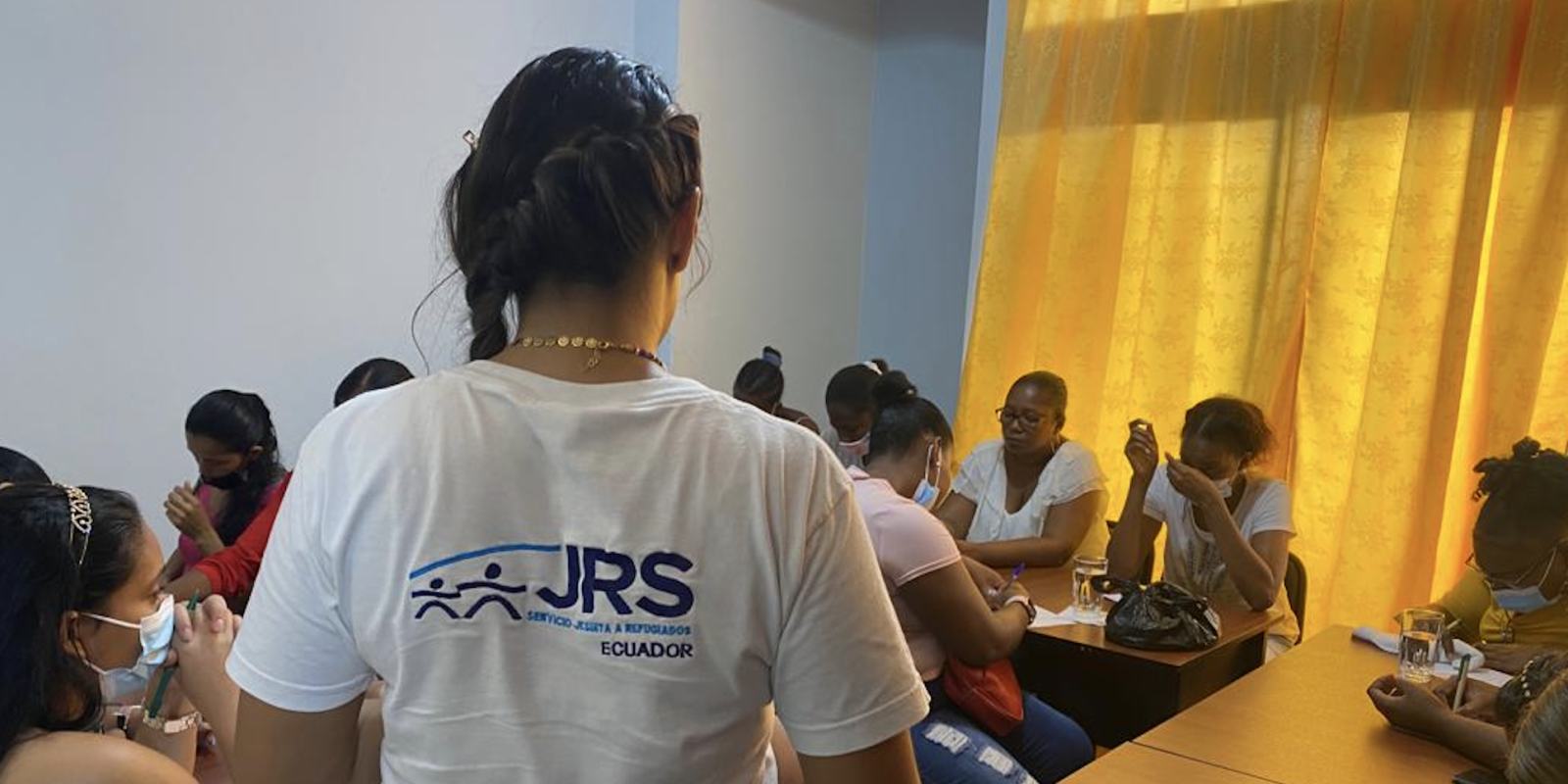Changing how we talk about Mental Health and Psychosocial Support
09 October 2023|Chloe Gunther

Western pop culture has adopted the term “trauma” as a trendy, catch-all phrase to describe difficult experiences and heavy emotions. We hear it used as a casual descriptor in our day-to-day conversations, stories on social media, and even throughout humanitarian work. But using this word has serious implications and, when misused, is counter-productive to improving global, mental health.
Katie Mullins, JRS/USA’s Senior Mental Health and Psychosocial Support (MHPSS) Specialist sat down to explain the layered reasons why it is imperative that language and discussions around mental health become more intentional and more nuanced.
“Talking about trauma has helped bring mental health into more conversations and decrease the stigma surrounding it,” Katie said, noting how the rise in “trauma” and similar language coincides with a societal shift towards increasing awareness around mental health.
But, Katie suggested, the pendulum has swung too far and using this diagnostic language without proper education or understanding can do more harm than good.
“It is not sufficient,” Katie said, “it does not capture the complexity of the human experience. Especially concerning the magnitude of the experience of displacement.”
At a fundamental level, Post Traumatic Stress Disorder (PTSD) is a specific diagnosis in the DSM – 5, the Diagnostic and Statistical Manual of Mental Health Disorders, and requires a specific, individualized treatment plan. But in Western culture, “trauma” has become a popular way of labeling a troubling event.
“When we say trauma, we are referring to PTSD, but people are using the term no to describe a bigger picture of people’s needs not being met…this is entirely inaccurate,” Katie said.
As Katie pointed out, PTSD was created in response to veterans who returned from war. Since PTSD became a mental health diagnosis in 1980, it has not been culturally adapted to appropriately classify the experiences of people around the world.
But in popular vernacular, “trauma” has become a way of emphasizing and calling attention to a troubling experience, even if they do not meet the criteria for a diagnosis of PTSD, which is a history of exposure to a traumatic event. The events referenced specifically are actual or threatened death, significant injury, or sexual violence.
Katie referenced a situation she observed when meeting with a group in the JRS community. The group told her they were traumatized by what was happening around them.
“I was listening to them voice their frustrations and they said they were traumatized…I was saddened,” Katie said, “to see a whole group of people give themselves that label and burden.”
The group was having trouble eating, sleeping, working because of an on-going environmental stressor. “They were very distressed,” Katie said. She emphasized that just because someone does not qualify for a PTSD diagnosis, that does not mean their emotions and experiences are easy.
“They were only using that term,” Katie said, “because it is so familiar with people now. It is how they believed their emotions and feelings would be validated.”
While many forcibly displaced people have experienced potentially traumatizing events, trauma is one, specific mental health concern and labeling a population with it neglects the personal, nuanced experiences and needs of each individual.
“Anxiety and depression are actually the most common mental health conditions in refugee communities, not PTSD,” Katie said.
Furthermore, describing an individual as “traumatized” implies that the danger and difficulty is in the past. Katie emphasized that for many refugees, the current, daily stressors of displacement – from where they are going to live to how they will feed their child – are much more immediate concerns and more damaging to people’s mental health. The distressing events are still on-going.
This is a common misperception people have about those experiencing displacement. People are having normal reactions to both the past experiences, and the day-to-day uncertainty and difficulty.
Mislabeling a person, community, or population as “traumatized” unfairly places the onus on the individual to figure out a way to “fix” their mental health, Katie said. Blame is put on the person instead of the systems that perpetuate injustice.
“For someone to stay resilient in light of what they have experienced, we need to make sure people have access to basic needs, social support, safety, security, and with those, people are able to heal from what they have endured.”
This is why, Katie suggested, psychosocial support is so important. But oftentimes it is being put aside because the care is not as specialized.
“For example, when setting up recreational programs for children, we often need to show improvement in wellbeing to demonstrate the impact of these activities,” Katie said. Projects rely on mental health diagnostic tools to demonstrate this like pre and post screenings for depression and anxiety in children participating in sports and games.
There is a misperception that we need to link these activities to decreasing mental health symptoms for them to be a valid psychosocial support intervention. “In actuality, we are trying to prevent these conditions from developing by providing positive social and physical activities,” Katie explained.
“Somehow, we have created the narrative that those simple, community-based activities are not as important, but we know they work.”
“One of the highest indicators for healing or not from a potentially traumatic event is the individual’s social network and if they have people they can talk to,” Katie said. Psychosocial support works directly to help re-build communities and facilitate spaces for healthy relationships.
So, how can we start changing how we talk about mental health so that we accurately describe actual, complex life experiences and respond appropriately? We can begin by using normal language, Katie said.
She referenced Peter Ventevogel, the Senior Mental Health Officer at United High Commissioner for Refugees. He suggests that we call things what they are: “really awful experiences or things to have happen.”
She also suggested the phrase “potentially traumatic” to describe what some people experience when they flee home due to conflict, violence, persecution, or an environmental crisis. This reaffirms an individual’s ownership over their experience and emotions while also acknowledging that being forced to flee home is incredibly difficult.
Or to at least avoid classifying an entire population as traumatized. Better yet, we can think of the ways we can support displaced people so we can prevent long term mental health conditions by providing for their basic needs, social support, and ensuring they are treated in a dignified and just way.
“MHPSS is inherent in JRS’ core values and in accompaniment,” Katie said, “if we can change our language, it leaves room and more opportunity for other interventions that have great validity.”



